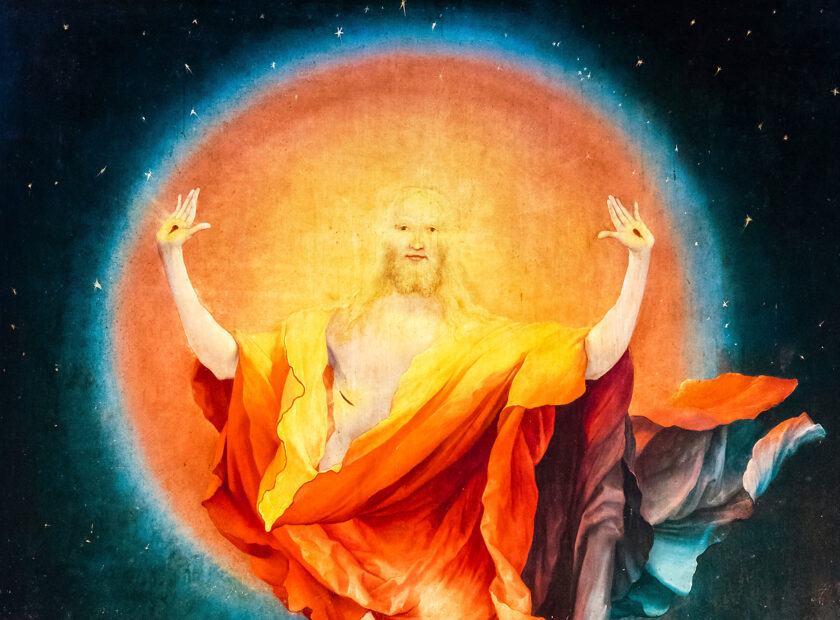The Last Judgement – what is it?
Jesus spoke of the Last Judgement; there is no doubt about that. But what is to be understood by it is interpreted by many rather according to human ideas and thus misses the spirit of Jesus’s message. In order to emphasise the threatening and inexorable character of the Last Judgement, one often uses the descriptions from the Book of Revelation. Few people are aware that the imagery of the Book of Revelation is a mystical show of visions whose symbols require interpretation – just like Jesus’s parables, which is why many take them literally. What Jesus wanted to make clear to us with his references to the Last Judgement can only be understood from the context of his teaching and the circumstances of his passion. This means that all the inspiration and interpretation that the apostles have left us in their writings, can only be given a coherent interpretation on the basis of the words and actions of Jesus. Any presentation that does not take into account the statements of Jesus’s message, misses the spirit of the Gospel.
God – the indivisible unity
The gospel, or the good news as it is translated, says that God „wills“ to forgive all guilt. Why is this so? Because God is forgiveness itself, and this means that „in“ God such things as guilt and punishment do not exist. If guilt and punishment existed in God, God would be divided, namely into a good and a bad, into a guilty and an innocent, part. But God is one in and with himself, that is, God is undivided and without contradiction. And whoever wants to reach God must themselves become and be one. For God is truth itself and this is indivisible, as the biblical texts also make clear:
Listen, Israel, YHWH our God is one God. Deuteronomy 6 And Jesus underlines this statement in a contrary metaphor: Every kingdom that is divided against itself will be laid waste; and every city or house that is divided against itself will not stand.
Matthew 12:26
And in this very sense Jesus makes it clear that God Himself does not judge: For the Father judges no one, but has committed all judgment to the Son.
John 5:22
This is the consequence of what has been said above, namely that God can only judge at all in relation to the Son. Why is this so?
God Himself is non-dual, but in the Son he has entered the world of duality and division in order to reunite it with God.
Therefore, we must „look“ to the Son to understand the nature of the Last Judgement. And in this sense, Jesus declares that he only does what he „sees“ the Father doing:
Amen, Amen, I say to you: The Son can do nothing By Himself, but only what he sees the Father do; for whatever the Father does, the Son also does in like manner.
John 5:19
But what do we see the Son doing, from which we can conclude what the Father is doing? The answer is simple: We see in Jesus Christ that Son who calls us to forgive unconditionally in order to live up to the nature of a united God: Judge not, and ye shall not be judged.
Do not condemn, and you will not be condemned. Forgive, and you will be forgiven.
Matthew 7, 1
And forgive us our trespasses, as we forgive those who trespass against us.
Matthew 6:12
For if ye forgive men their trespasses, your heavenly Father will also forgive you. But if you do not forgive men, neither will your Father forgive you your trespasses.
Matthew 6:14-15
Now I pray not for them only, but also for them who shall believe in me through their word; that they all may be one, even as thou, Father, art in me, and I in thee; that they also may be one in us, that the world may believe that thou hast sent me. And I have given them the glory which you gave me, that they may be one, even as we are one.
John 17:20-22
But Jesus not only demands this willingness from us, He Himself consistently fulfils this demand by dying on the cross to forgive His enemies. This is what the Son sees the Father „doing“ and therefore the Son can also only act in this way, namely forgive unconditionally. It is through this attitude of mind that we (where we embrace it), come to God. This is our way to God. There is no other way, as Jesus makes clear:
I am the way and the truth and the life; no one comes to the Father except through me.
John 14:6
For in the certainty that all things must serve the one who trusts in this unity, the Son was able to practise all-embracing forgiveness and proclaim from the cross:
Father, forgive them, for they know not what they do!
Luke 23:34
Forgiveness through insight into the nature of God
Jesus Christ came to proclaim and to make clear through his passion that in the sphere of the Spirit (in God) there can be no cause for condemnation or punishment. Therefore, we are to understand our own lives as Jesus understood His life. But how did Jesus understand and comprehend His own life? Jesus was given to find the will of God in the senselessness and spiritlessness of the injustice committed against Him: slander, accusation, condemnation, torture and execution, whereby these events had to find meaning.
As long as we attribute injustice, suffering and death to an evil fate or to our enemies, we will suffer harm.
We will be harmed insofar as we will have to break down inwardly because of a reality with which we are divided. But what we take upon ourselves according to God’s will must become good, because only good, only life, flows from God.
Jesus Christ came so that the reason and cause of our suffering might change.
For whosoever will save his life shall lose it: but whosoever shall lose his life for my sake shall find it.
Matthew 16:25
This is the substantive and spiritual consequence that follows from the passion of Jesus. Jesus saw himself in a position to recognise the will of God in injustice, suffering and death, whereby he overcame these areas of humanity so that they could become good, an example and comfort to us.
He walked a little farther and knelt with his face to the ground, praying, “My Father! If it is possible, let this cup of suffering be taken away from me. Yet I want your will to be done, not mine.”
Mark 14:36
In the world ye are afraid: but be of good cheer, I have overcome the world.
John 16:33
Even the very hairs of your head are all numbered. Therefore, do not be afraid … Luke 12:7
Luke 12:7
And you will be hated by everyone for My name’s sake. And yet not one hairon your head shall perish.
Luke 21:17
We see that the understanding of life that Jesus proclaimed in his message is an all-encompassing and perfect understanding of life – an understanding of life in which all things, without exception, find meaning as soon as we place our trust in the power of the Spirit who makes all things work for our good, if only we trust completely in Him.
We know that all things work together for the good of those who love God…
Romans 8:28
The Last Day – the unified reality
The Last Judgement and the Last Day are one, but from two different perspectives. The Last Day is the manifestation of that timeless reality which Jesus proclaimed in His message and whose essence He made clear to us in His Passion. But what kind of reality is it? It is the reality of the Righteous One who creates justice without accusation, without punishment, without retribution, but by accepting all events from the hand of God, whereby alone they can become good. In this certainty Jesus receives everything without exception according to the will of God and in this way fills it with spirit and meaning.
This applies particularly to all mindless and senseless areas of our humanity because God cannot be limited, hurt, hindered or impaired by anything, everything must serve Him.
Whoever recognises his life anew in this way in God, from now on everything must serve Him as it served Jesus. In order to show us this fundamental truth, Jesus Christ came and in His Passion took upon himself the abyss of humanity. He came to overcome the unrighteous, the evil, dark and base events, through the Spirit (through God), whereby they could now serve, just as He declared to His disciples on the eve of His imprisonment:
If you loved Me, you would rejoice that I said, „I go to the Father“; for the Father is greater than I am.
John 14, 27
But because I have spoken these things, your heart is filled with sorrow. But I tell you the truth, it is good for you that I go. For if I do not go, the Comforter will not come to you; but if I go, I will send him to you.
John 16:7
The Last Judgement – the Divided Reality
Now one will ask: If forgiveness is the pivot of the Gospel, then why The Last Judgement and in what way will we be judged? The first answer to this is: because all division with God is limited. But the limited is not the eternal and timeless. The sphere of the spirit (God) is the timeless and unlimited and outside it, nothing permanent exists. The limited ends one day, but the eternal and timeless is everlasting.
Insofar as we think and act in a limited way, we ourselves will have to find an end. This is the judgement that one day all limitation will end – inevitably.
Our human thinking in categories of punishment and retribution is a limited one because it springs from a divided understanding of reality. In order to gain the eternal, the timeless, the limited and time-bound, we must mentally overcome it, because in overcoming the limited, all division and divisiveness also ends – all guilt and accusation also ends.
The Last Judgement is nothing other than a revelation of our division with God, in whom all things have always been one. One day all divisiveness must end, precisely because it is limited. Just as the power of a lie ends when the truth comes to light, so too all that is limited and temporal ends when it comes into contact with or is confronted with the reality of the timeless and boundless. The boundless and timeless, however, is not exclusively something future, for what is timeless has always been true, for it is without a beginning and without an end. That is, it applies both within time and beyond. Therefore Jesus taught:
The time is coming, indeed it is already here, for the dead to hear the voice of the Son of God. Whoever listens to it will live. John 5:25
For behold, the kingdom of God is in your midst.
Luke 17, 22
For behold, the kingdom of God is within you.
In this respect, the essence of the Last Judgement is not based on a whim, a discretion or weighing of a judgement by a judge, as some people like to imagine, but it is based on the inescapable consistency of the Spirit, who gives to every creature everything that it asks and calls for: whoever values, practises and asks for mercy and mercy receives mercy. Whoever sets and seeks for condemnation and retribution receives judgement.
Blessed are the merciful, for they shall obtain mercy.
Matthew 5:7
Not that God Himself would condemn – no, in God there is no condemnation. But as far as that error prevails in us which makes us believe that through division, that is, through revenge, retribution and punishment, the world or man can be improved, then we are not in God. But if we are not one with that power which works all things without exception, the burdensome and sorrowful things cannot serve us for good either, as the Apostle Paul explains in the Letter to the Romans:
But we know that to those who love God all things work for good …
Romans 8:28
The Last Day – Man’s Destiny
I would like to give another answer to the above question as follows: We do not feel the human longing and desire for unlimited life by chance. For intuitively we know about the ideal and timeless core of our existence. The proof is our sadness about the finiteness of human life and the longing for „more“. We all carry within us an inkling that the whole is „more“ than the sum of its parts, as Aristotle said. And by following this longing, we go towards our true destiny. This primordial longing for life must now be interpreted in the spirit of Jesus, for he came so that we might understand and recognise our life in a new, larger and timeless framework, whereby it is filled with spirit. The Last Day, like the Last Judgement, is nothing other than the fulfilment of our longing for life and spirit – but in an unlimited, undivided and unconditional sense. Since all limitation, division and separation of life through injustice, error, disease, weakness, suffering and death is temporal, it will have to end with time. Insofar as we understand our lives in a purely temporal sense, we are mortal and therefore we must be disappointed on the Last Day when all limited things end. The disappointment in what we thought was life is something entirely different from what we will feel as judgement.
We can and will only be what we love with all our hearts. No more and no less.
Since in God there is no opposite and insofar no unwillingness, we will only be able to receive what we love, value and want here with all our heart, on that day. Insofar as our hope, love and appreciation is directed towards something that will one day end, this „object“ will have to come to an end. Judgment Day is the dawning of a timeless and unlimited understanding of life within us. A life to which we, through its message, are to find already here in this world. For only this understanding will prove to be a valid and sustainable one on the Last Day – then, when everything time-bound ends. If we understand our life in the spirit of Jesus, our life gains this state of timelessness. This state will one day, when the temporal ends, lift us above all temporal things and carry us, just as the ark did in the days of Noah. Amen, Amen, I say to you:
He that heareth my word, and believeth in him that sent me, hath everlasting life, and shall not come into condemnation: but is passed from death unto life.
John 5:24
The Day of Judgement and the Last Judgement in the Parables of Jesus
In many parables Jesus deals with the nature of the Last Judgement. Each parable illuminates in its own special way the principle of division and separation that we carry within us and how it will prevent us from entering into a new, united life on the Last Day. For new, imperishable life can only be received by those who carry and embody the undivided principle of life within themselves. Of course, the four parables described below convey much more content. Here I only highlight the final sequences in each case, in which Jesus addresses the involuntary and painful separation, disappointment and divisiveness and the feeling of being set back. Each individual scenario conveys a sense of the dawning of the Kingdom of God and can thus also be seen as a description of the „circumstances“ on the Last Day or the Last Judgement.
The parable of the prodigal son (Luke 15:11-32)
Divine and human understanding of privilege
At the end of the parable of the prodigal son, the father arranges a feast for the returned younger son who has dishonestly carried through his paternal inheritance. The elder son is stunned and falls out with the father over his magnanimous gesture. His displeasure is so great that he refuses to attend the feast. The parable shows how a life of supposed blamelessness and privilege makes us miss the mark. It is not the father (God) who excludes the elder brother, but the elder son refuses himself to be one with the father (God) and the brother (son).
The parable of the ten bridesmaids (Matthew 5:1-13)
Valuing the indispensable – at the right time and at the wrong time
This parable is about acquiring the foundation of light, which here stands as an allegory for living out of the Spirit. The metaphor here is lamp oil, which is to be acquired and gained in the day, i.e. during this life (at the right time). In the final sequence of the parable, all ten virgins fall asleep, which is a symbol of death. Upon their reawakening, namely the resurrection, the possibility of immediate entrance to the wedding feast opens up for one group. The second group without lamp oil finds a divided reality. The door to the feast opens for all, but not all can participate. Here, the condition for participation in the feast does not lie in the invitation, but in a missing prerequisite of the second group, namely that everyone bring their light to the celebration. Light is the prerequisite here for the nightly celebration to take place. The lack of lamp oil is painfully felt by the second group, which is why they set out in the middle of the night (at the wrong time) to acquire oil. But they are not allowed entry on their return, as the bridegroom declares the company complete.
The parable of the labourers in the vineyard (Matthew 20:1-16)
Valuing and devaluing through unexpected appreciation
In this parable, the first hired labourers who started work early in the morning feel unequal treatment compared to those labourers who were hired gradually during the day and joined later. The vineyard owner keeps his promise to pay a reasonable daily wage. But among the workers who have worked the full day, it causes annoyance when, when they are paid, those who have joined much later also receive the full day’s wages. Again, the cause of the former’s annoyance is not malicious degradation by the vineyard owner – on the contrary, the payout is generous overall but the expectation of the firsts that they must be entitled to more, suddenly makes their payment seem inferior, thereby devaluing their pay itself. Here, too, it is the privileged thinking of the first that makes them feel inferior in the end.
The parable of the ranking of the guests (Luke 14:7-14)
Degradation through pride – honour through humility
After observing the guests and hosts at a wedding feast to which Jesus himself was invited, he draws parallels with the nature of the Kingdom of God. In this parable, he addresses the situation where guests place themselves close to the host, but then have to be told that this place is reserved for another guest, so that they have to take a more distant place at the table in full view of the public. Jesus here describes the scenario of being set back and humiliated in full view of the public. Again, it is the high opinion one has of oneself that is revealed on that day, which then makes one feel embarrassingly set back. The „setting back“ must not be misinterpreted as an act of punishment. Rather, it follows from the necessity of the host’s organisation. Jesus therefore calls for humility and sincere self-assessment, so that the Last Day is not perceived as a day of setting back, but as a day of moving up, towards the centre of the festive event – towards God.
Elmar Wieland Vogel on 2. 7. 2023 Available at: https://christophilos.de







Schreibe einen Kommentar